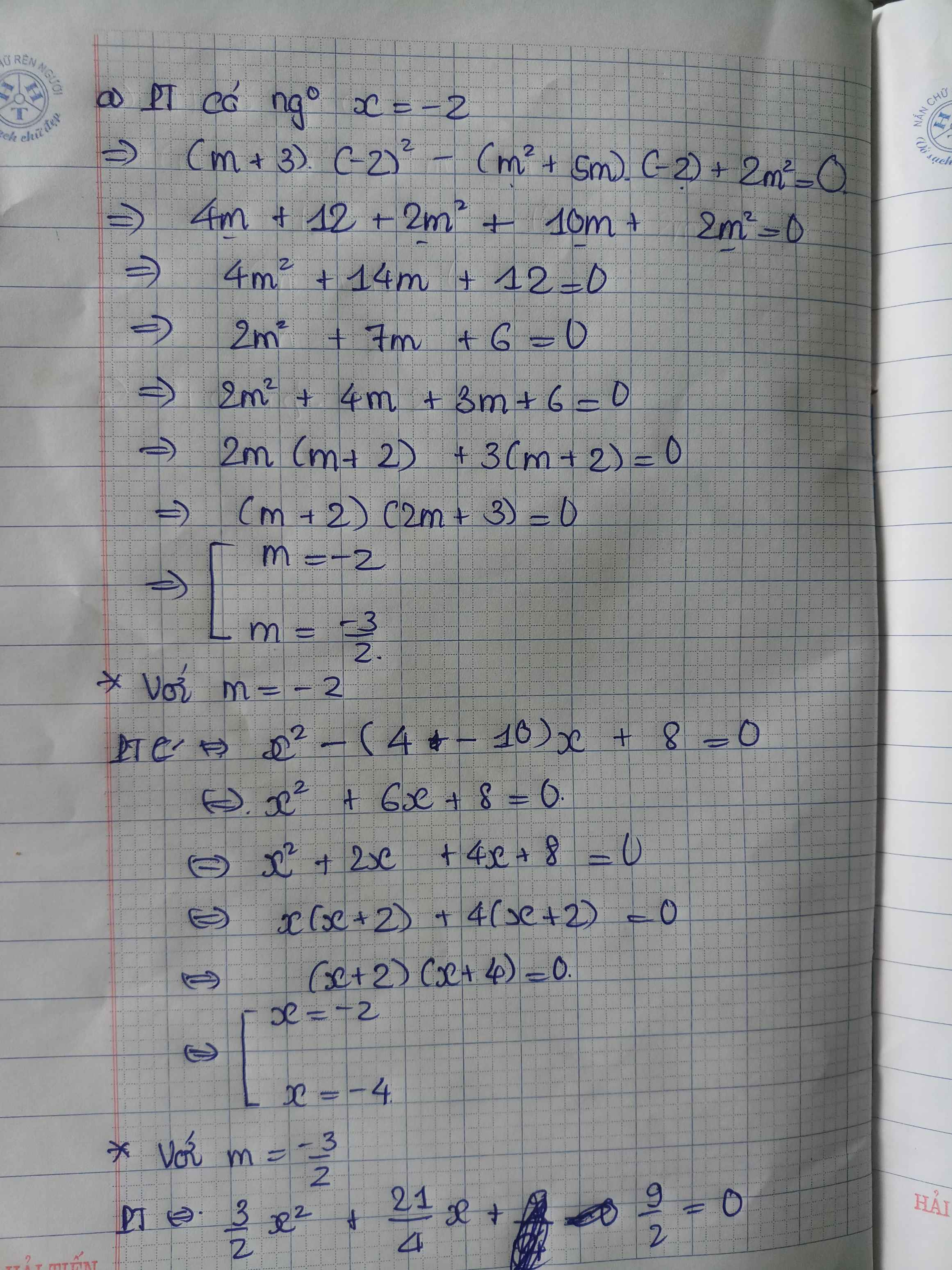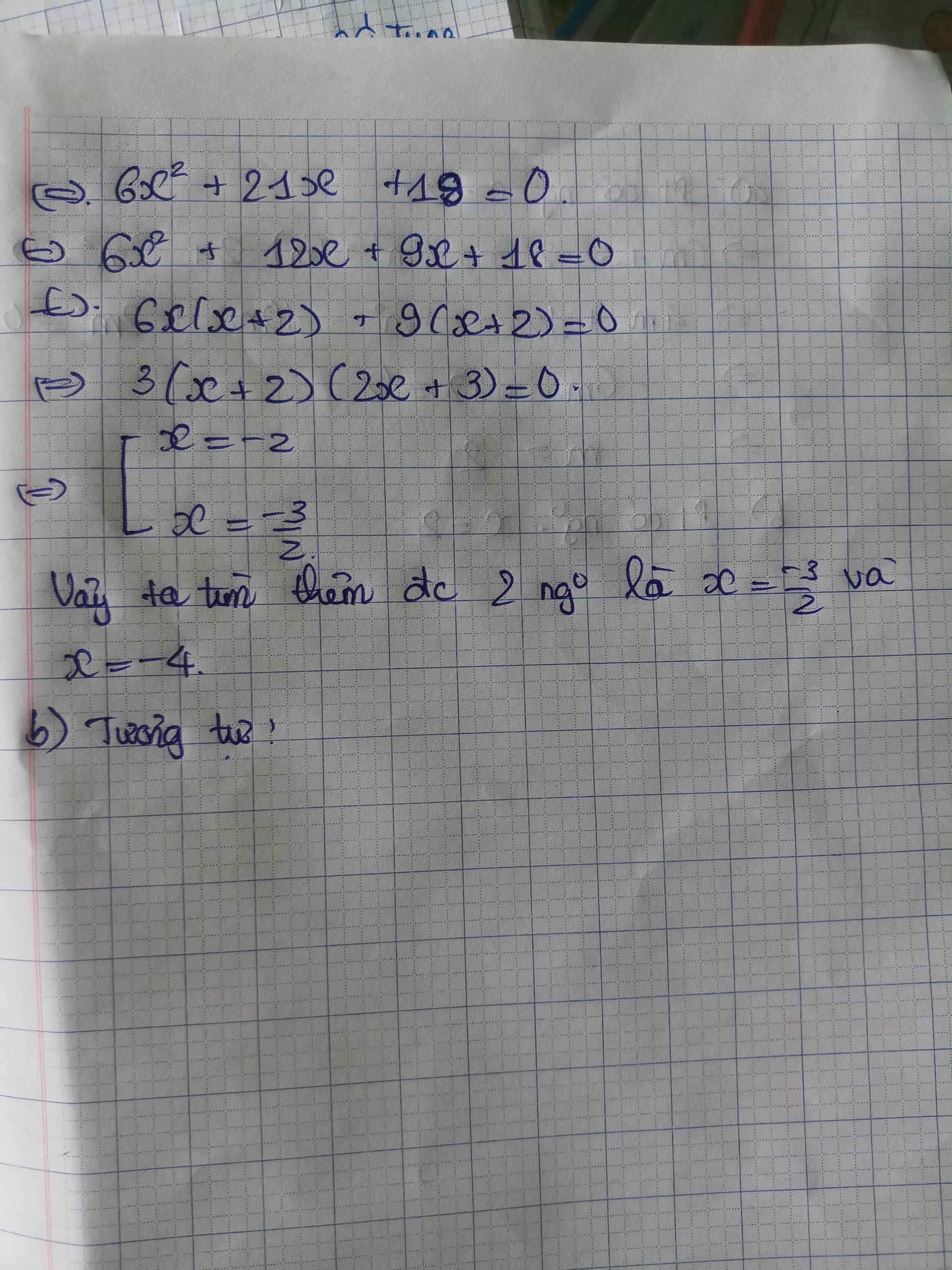Tìm m để bất phương trình sau có nghiệm: \(x^2-2\left(m+1\right)x+4\left(m+1\right)< 0\)
Hãy nhập câu hỏi của bạn vào đây, nếu là tài khoản VIP, bạn sẽ được ưu tiên trả lời.


Đặt \(f\left(x,m\right)=\left(m^2+1\right)x^2+\left(2m+1\right)x-5\)
\(ycbt\Leftrightarrow\hept{\begin{cases}f\left(-1,m\right)\le0\\f\left(1,m\right)\le0\end{cases}}\Leftrightarrow\hept{\begin{cases}m^2-2m-5\le0\\m^2+2m-3\le0\end{cases}}\Leftrightarrow\hept{\begin{cases}1-\sqrt{6}\le m\le1+\sqrt{6}\\-3\le m\le1\end{cases}}\)
\(\Leftrightarrow1-\sqrt{6}\le m\le1\)
Đặt ƒ (x,m)=(m2+1)x2+(2m+1)x−5
ycbt⇔{
| ƒ (−1,m)≤0 |
| ƒ (1,m)≤0 |
⇔{
| m2−2m−5≤0 |
| m2+2m−3≤0 |
⇔{
| 1−√6≤m≤1+√6 |
| −3≤m≤1 |
⇔1−√6≤m≤1

b) Thay x=2 vào pt, ta được:
\(4\left(m^2-1\right)-4m+m^2+m+4=0\)
\(\Leftrightarrow4m^2-4-4m+m^2+m+4=0\)
\(\Leftrightarrow5m^2-3m=0\)
\(\Leftrightarrow m\left(5m-3\right)=0\)
\(\Leftrightarrow\left[{}\begin{matrix}m=0\\m=\dfrac{3}{5}\end{matrix}\right.\)
Áp dụng hệ thức Vi-et, ta được:
\(x_1+x_2=\dfrac{2m}{m^2-1}\)
\(\Leftrightarrow\left[{}\begin{matrix}x_2+2=0\\x_2+2=\dfrac{6}{5}:\left(\dfrac{36}{25}-1\right)=\dfrac{30}{11}\end{matrix}\right.\Leftrightarrow\left[{}\begin{matrix}x_2=-2\\x_2=\dfrac{8}{11}\end{matrix}\right.\)

\(\left\{{}\begin{matrix}x^2-3x-4< 0\\\left(m-1\right)x-2>0\end{matrix}\right.\)
\(\Leftrightarrow\left\{{}\begin{matrix}\left(x+1\right)\left(x-4\right)< 0\\\left(m-1\right)x-2>0\end{matrix}\right.\)
\(\Leftrightarrow\left\{{}\begin{matrix}-1< x< 4\\\left(m-1\right)x-2>0\end{matrix}\right.\left(1\right)\)
TH1: \(m< 1\)
\(\left(1\right)\Leftrightarrow\left\{{}\begin{matrix}-1< x< 4\\x< \dfrac{2}{m-1}\end{matrix}\right.\)
Yêu cầu bài toán thỏa mãn khi \(\dfrac{2}{m-1}>-1\Leftrightarrow2< -m+1\Leftrightarrow m< -1\)
\(\Rightarrow m< -1\)
TH2: \(m=1\)
\(\left(1\right)\Leftrightarrow\left\{{}\begin{matrix}-1< x< 4\\-2>0\end{matrix}\right.\left(vn\right)\)
TH3: \(m>1\)
\(\left(1\right)\Leftrightarrow\left\{{}\begin{matrix}-1< x< 4\\x>\dfrac{2}{m-1}\end{matrix}\right.\)
\(\dfrac{2}{m-1}< 4\Leftrightarrow4m-4>2\Leftrightarrow m>\dfrac{3}{2}\)
\(\Rightarrow m>\dfrac{3}{2}\)
Vậy \(m< -1;m>\dfrac{3}{2}\)

- Với \(m=\dfrac{1}{2}\) ko thỏa mãn
- Với \(m\ne\dfrac{1}{2}\)
\(\Leftrightarrow\left(2m-1\right)x^3-\left(2m-1\right)x^2-\left(m-2\right)x^2+\left(m-4\right)x+2\ge0\)
\(\Leftrightarrow\left(2m-1\right)x^2\left(x-1\right)-\left(x-1\right)\left[\left(m-2\right)x+2\right]\ge0\)
\(\Leftrightarrow\left(x-1\right)\left[\left(2m-1\right)x^2-\left(m-2\right)x-2\right]\ge0\) (1)
Do (1) luôn chứa 1 nghiệm \(x=1\in\left(0;+\infty\right)\) nên để bài toán thỏa mãn thì cần 2 điều sau đồng thời xảy ra:
+/ \(2m-1>0\Rightarrow m>\dfrac{1}{2}\)
+/ \(\left(2m-1\right)x^2-\left(m-2\right)x-2=0\) có 2 nghiệm trong đó \(x_1\le0\) và \(x_2=1\)
Thay \(x=1\) vào ta được:
\(\left(2m-1\right)-\left(m-2\right)-2=0\Leftrightarrow m=1\)
Khi đó: \(x^2+x-2=0\) có 2 nghiệm \(\left[{}\begin{matrix}x_1=-2< 0\left(thỏa\right)\\x_2=1\end{matrix}\right.\)
Vậy \(m=1\)

- Với \(m=2\) BPT luôn có nghiệm
- Với \(m\ne2\) BPT vô nghiệm khi và chỉ khi:
\(\left\{{}\begin{matrix}m-2< 0\\\Delta'=\left(m+1\right)^2-2m\left(m-2\right)\le0\end{matrix}\right.\)
\(\Leftrightarrow\left\{{}\begin{matrix}m< 2\\-m^2+6m+1\le0\end{matrix}\right.\)
\(\Rightarrow m\le3-\sqrt{10}\)

\(a,\Leftrightarrow\Delta'\ge0\\ \Leftrightarrow\left(m+2\right)^2-\left(m^2-4\right)\ge0\\ \Leftrightarrow m^2+4m+4-m^2+4\ge0\\ \Leftrightarrow4m+8\ge0\\ \Leftrightarrow m\ge-2\\ b,\Leftrightarrow\Delta'=0\Leftrightarrow m=-2\)

Để bất phương trình có tập nghiệm là R thì \(\left(m-2\right)^2-4\left(m+1\right)< 0\)
\(\Rightarrow m^2-4m+4-4m-4< 0\)
=>m(m-8)<0
=>0<m<8
Để bất phương trình đã cho có tập nghiệm là R thì
\(\left\{{}\begin{matrix}a>0\\\Delta\le0\end{matrix}\right.\) (với a là hệ số của x2 và bằng 1, thỏa)
\(\Rightarrow\) (m-2)2-4.(m+1)\(\le\)0 \(\Leftrightarrow\) m2-8m\(\le\)0 \(\Leftrightarrow\) 0\(\le\)m\(\le\)8.


Bất phương trình đã cho có nghiệm khi:
\(\Delta'=m^2+2m+1-4m-4=m^2-2m-3< 0\)
\(\Leftrightarrow-1< m< 3\)